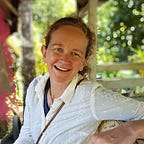Economy or Society: Our Post-Covid-19 Decisions
Do we want to live in an economy or a society? (Damon Gameau, April 2020)
Damon Gameau, director of the film 2040, posed this question back in April, amid the height of Covid-19 panic in Australia, enticing us to ponder our post-pandemic reality. It’s an important question, which is potentially divisive. I’ve been musing on this conundrum ever since, alongside easing social distancing restrictions and the emphasis on Australia’s economic recovery. Now and in the near future, to a certain extent, we have an opportunity to choose how we recover from this global crisis. We can decide what our future might look like; how we might build a stronger, more resilient society; and whether we want to live in an economy or a society, or both!
Does it have to be a choice about whether we want to live in an economy OR a society? Should one be prioritised over the other? Could an economy that helps build a cohesive society exist? Or an economy that supports the physical, emotional and spiritual well-being of its citizens? Could societies be built on unification rather than division, where people are supported to thrive rather than encouraged to eternally pursue individualistic material wealth?
How could we do things differently in the future? Could we adapt our economy so that human well-being is elevated over profit; where successful countries would be those who protect and care for people, particularly during times of crisis; and countries who are able to collaborate with other countries to resolve cross-border issues.
Where workers are valued not just for their productivity, but also by the quantity and quality of time they are able to dedicate to their families and their own health. Could those who care and tend to those who are unwell in our communities and those who educate and nurture young minds be valued differently, with wages emulating the heights of our collective appreciation for them.
Could we re-orientate our economy towards repairing and restoring local ecosystems instead of allocating them fragments beside expanding infrastructure and developments? Could we create more livelihoods based on producing a lower carbon, more biodynamic, less polluting society?
Could we create more space in our lives for the things we love? For the activities that we usually compress into time constrained days? Could we prioritise social connection with the people who really matter, those whom we have been forced to spend more time with lately or those whom we have missed seeing through Covid-19 restrictions?
Could we change? Or will we/are we hurriedly resuming our post-Covid-19 fast paced lives and remember this period as a discrete moment in our lives?
The last few months have demonstrated that, despite our struggles, we, people all over the world, have shown our strength, adaptability and resilience alongside our vulnerability and interdependence. This is our opportunity to redirect ourselves towards a brighter future. A future which may contain different tourism options, adapted workplaces and more digital connectivity, but also a future where a healthy economy is intertwined with healthy communities and flourishing ecosystems.
So, do we want to live in economy or a society? For me, the answer is both. I don’t want to live in an economy where financial gain reigns supreme, but I do recognise that sustainable, healthy and happy livelihoods can be supported by an economy which is oriented towards achieving such a society.
